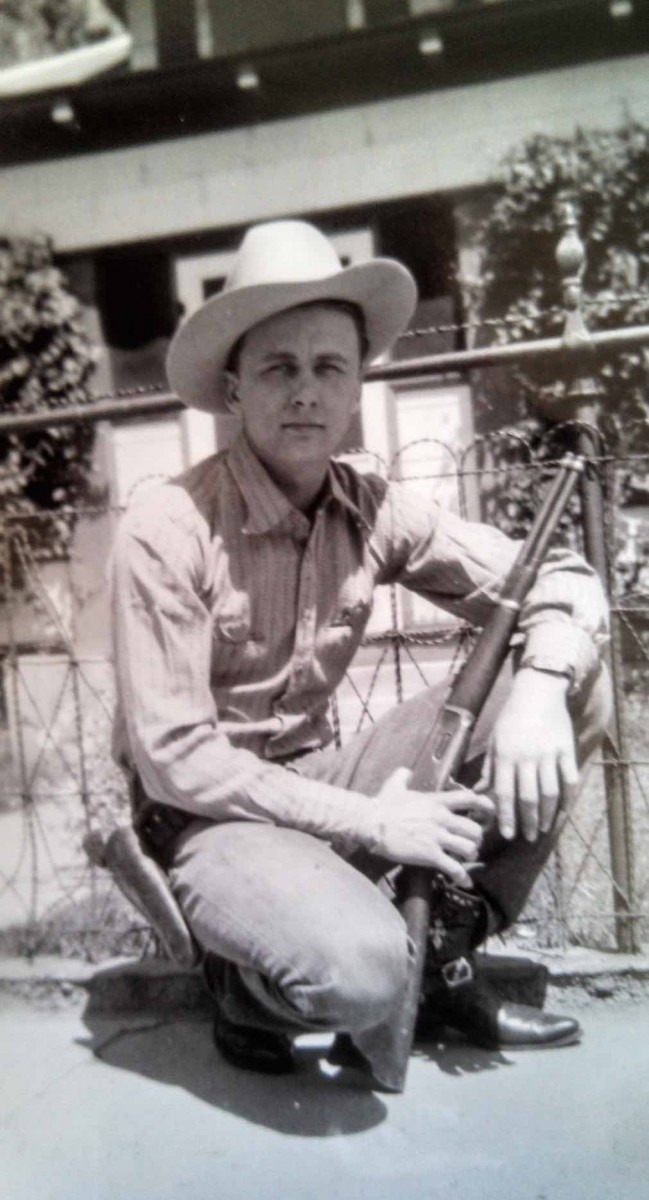 Raymond Westerman couldn’t even walk when he sat on his first horse.
Raymond Westerman couldn’t even walk when he sat on his first horse.
There’s a photograph of the Arizona native perched on a horse at just 6 months of age. Bonita — the family called her “Bonnie” for short — was the same horse Westerman’s mother, a schoolteacher, would ride on the 4-mile path to and from the schoolhouse each day.
Born in Clifton and raised in Florence, Westerman will be 95 in December. He’s lived in Wickenburg since he built a house there in 1977 and moved into it with his family in January of 1978.
He still has warm recollections of competing in rodeos. He was just 10 or 11 years old when he entered the first Junior Parada Rodeo in Florence. Today, he may be the only surviving participant in that inaugural event.
Recognized as the oldest junior rodeo in the United States, the 83rd Junior Parada Rodeo is set for this Thanksgiving weekend. Westerman says it’s not quite like the old days, when admission was free and contestants didn’t win cash prizes. Instead, local merchants donated items for the young rodeo champions. Westerman won a flannel shirt and movie passes to the local Isis Theatre (“Just like the bad guys — I never knew why it was named that,” he adds).
The Junior Parada Rodeo was the brainchild of Mark Twain Clemens and Bill Clemens, along with the town marshal, Charlie Whitlow — the namesake of the Charles Whitlow Rodeo Arena, where the rodeo takes place.
“Mark was my dad’s age and didn’t have any kids, so I was kind of under his wing. Second father, you know,” Westerman says. “They had big ranches, the Clemenses did … and Charlie Whitlow had the W-4 Ranch up the river about 14 or 15 miles. They got together and decided they would have a kids rodeo. Then, they got some cowboys to go out and catch up some wild colts that were the proper size for the two [age] groups — I think it was from 5 to 10 and 10 to 16.”
Westerman distinctly remembers the rodeo’s mounted-basketball game. Sans saddle, the riders on each team would use a partly deflated soccer ball to try to score a basket on the opposite side of the arena.
“As long as I was there, must have been for six or eight years, we never had a basket scored against us,” he says. “Not even a single basket. We got horses that would run right into the other horse and knock him off his feet.”
With a bona fide Old West upbringing, Westerman once made it in the newspaper when he shot a jackrabbit to feed his dog and discovered the rabbit was pregnant. He safely delivered the bunnies, says his daughter, Tammy. His mother worked for the Arizona Republican (later the Republic) for more than 60 years, starting in 1923 by covering prisons. As a teenager, Westerman would ride his horses to the Florence prison and inmates would fit them with shoes.
After competing in every Junior Parada Rodeo until he was “aged out,” Westerman then signed up for larger rodeos, even galloping through Boston and New York City. While in the Big Apple for a 1940 rodeo, he crossed paths with Gene Autry and the pair chatted in the stands.
“Gene was a nice guy, as comfortable as an old shoe,” Westerman says, recalling how he spoke with the legendary “Singing Cowboy” about the death of Western silent-film star Tom Mix.
Westerman also rode in Wickenburg’s annual Desert Caballeros Ride for 20 years.
“So then I did do rodeos — bareback and bulls,” he says. “But I decided that that wasn’t conducive to a long life. You really get banged up. Everybody was banged up to some degree. I couldn’t last too long at that, so that’s why I quit and started to go to college [at Arizona State University] to get a degree in veterinary medicine. And the war ruined that, too.”
When he heard of the attacks on Pearl Harbor, Westerman took action.
“I felt I had to do it for my country,” he says. “So, I went down and enlisted. For big money — $21 a month, before deductions. At the end of the war I was a lieutenant, and they offered me a permanent commission. I did that for 26 years, seven months and 11 days. Then I retired as a full colonel.”
From time to time, Westerman still stops by Wickenburg’s local rodeo, and he writes letters to the local newspaper and calls town officials to voice his distaste for Wickenburg’s growing subsidization.
That should come as no surprise. From riding bareback bulls to climbing the U.S. military ranks during World War II, and now “fightin’ with the town,” Raymond Westerman has never been one to sit idly by.
— Emily Lierle
The 83rd Junior Parada Rodeo will take place Saturday and Sunday, November 28 and 29, in Florence. For more information, visit www.florencejrparadarodeo.com.

